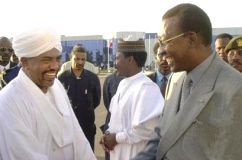Sudan and Chad’s leaders to meet on Darfur with AU next week
NDJAMENA, Feb 7 (AFP) — The presidents of Sudan and Chad will meet African Union (AU) officials next week to discuss enforcing a ceasefire in a civil war which has caused a massive humanitarian crisis in west Sudan’s Darfur region, a Chadian mediator said Monday.

|
|
Idriss Deby meets with Omer el-Bashir, in Khartoum, on Wednesday, December 10, 2003 (AFP). |
Ahmat Allami, spokesman for a team involved in mediating an end to the two years of conflict spilling across Chad’s eastern border, announced the talks in Ndjamena on February 15-16, as the AU said the situation in Darfur “had progressively deteriorated to appalling levels over the last four months”.
The war waged since February 2003 largely between Arab Janjaweed militias backed by Khartoum and two Darfur rebel groups, has claimed the lives of 70,000 people and driven 1.6 million people to flee, according to UN figures.
Sudan’s President Omar el-Beshir is due to meet Idriss Deby of Chad, which has taken in scores of thousands of refugees, Olusegun Obasanjo of Nigeria, who currently chairs the AU, and AU executive secretary Alpha Oumar Konare to “reflect on measures to see the ceasefire respected”, Allami said.
“This will entail knowing where rebel positions are in order to enforce a ceasefire, the neutralisation and disarming of the Janjaweed and the withdrawal of government forces to their positions of before December 8, 2004, in line with the last resolution made by the AU Peace and Security Council” in Gabon, he said.
AU special representative in Sudan, Saba Gana Kingibe, said Monday in a report that security in Darfur “had progressively deteriorated to appalling levels over the last four months, with unacceptable consequences to the peace and tranquility of the civilian populations.”
He blamed all sides to the conflict, but stated that “the worst perpetrators were mostly the (Janjaweed) who appeared to enjoy immunity from their inhuman and brazen acts of destruction of life and property wherever they struck.”
An AU mission is currently in South Darfur, one of three provinces in the region, investigating an air raid by government planes reported to have killed about 100 people on January 26. Thirty people were killed on January 13 and 24 more on January 21 in previous air raids, according to AU reports.
The AU, based in the Ethiopian capital, has repeatedly urged the Arab and Islamic government in Khartoum to rein in the militias, who have been accused of “genocide” by witnesses, human rights organisations and even foreign governments like that of the United States.
The main victims of the fighting are Darfur’s villagers of black African origin, on whose behalf the rebels said they were taking up arms, like a larger rebel movement in south Sudan whose separatist war with Khartoum officially ended last month.
Sudan is Africa’s largest country, with a mainly Arab north and black and usually Christian or animist communities in the south and in other regions. The conflict in the south has in the past year and more begun to draw to a close with peace accords after more than 21 years of fighting.
Peace talks between Khartom and Darfur’s rebel Sudan Liberation Movement (SLM) and Justice and Equality Movement (JEM) have been under way in Abuja, the Nigerian capital, but stalled last year after both sides agreed on a ceasefire but Khartoum rejected a draft AU peace settlement.
The talks on February 15 and 16 will also be attended by representatives of Libya, the United States, France and the European Union, Allami said. European leaders, like Washington, have condemned ceasefire breaches and expressed serious concern at the air attacks.
Khartoum has simply denied carrying out air raids, saying the government would not bomb its own people.
